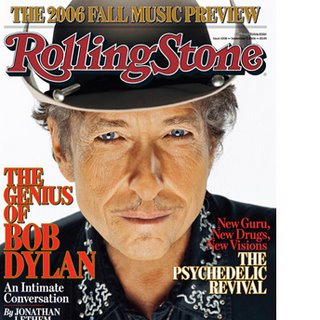JONATHAN LETHEM

"I don't really have a herd of astrologers telling me what's going to happen. I just make one move after the other, this leads to that." Is the voice familiar? I'm sitting in a Santa Monica seaside hotel suite, ignoring a tray of sliced pineapple and sugar-dusty cookies, while Bob Dylan sits across from my tape recorder, giving his best to my questions. The man before me is fitful in his chair, not impatient, but keenly alive to the moment, and ready on a dime to make me laugh and to laugh himself. The expressions on Dylan's face, in person, seem to compress and encompass versions of his persona across time, a sixty-five-year-old with a nineteen-year-old cavorting somewhere inside. Above all, though, it is the tones of his speaking voice that seem to kaleidoscope through time: here the yelp of the folk pup or the sarcastic rimshot timing of the hounded hipster-idol, there the beguilement of the Seventies sex symbol, then again -- and always -- the gravel of the elder statesman, that antediluvian bluesman's voice the young aspirant so legendarily invoked at the very outset of his work and then ever so gradually aged into.
It's that voice, the voice of a rogue ageless in decrepitude, that grounds the paradox of the achievement of Modern Times, his thirty-first studio album. Are these our "modern times," or some ancient, silent-movie dream, a fugue in black-and-white? Modern Times, like Love and Theft and Time Out of Mind before it, seems to survey a broken world through the prism of a heart that's worn and worldly, yet decidedly unbroken itself. "I been sitting down studying the art of love/I think it will fit me like a glove," he states in "Thunder on the Mountain," the opening song, a rollicking blues you've heard a million times before and yet which magically seems to announce yet another "new" Dylan. "I feel like my soul is beginning to expand," the song declares. "Look into my heart and you will sort of understand."
What we do understand, if we're listening, is that we're three albums into a Dylan renaissance that's sounding more and more like a period to put beside any in his work. If, beginning with Bringing It All Back Home, Dylan garbed his amphetamine visions in the gloriously grungy clothes of the electric blues and early rock & roll, the musical glories of these three records are grounded in a knowledge of the blues built from the inside out -- a knowledge that includes the fact that the early blues and its players were stranger than any purist would have you know, hardly restricting themselves to twelve-bar laments but featuring narrative recitations, spirituals, X-rated ditties, popular ballads and more. Dylan offers us nourishment from the root cellar of American cultural life. For an amnesiac society, that's arguably as mind-expanding an offering as anything in his Sixties work. And with each succeeding record, Dylan's convergence with his muses grows more effortlessly natural.
How does he summon such an eternal authority? "I'd make this record no matter what was going on in the world," Dylan tells me. "I wrote these songs in not a meditative state at all, but more like in a trancelike, hypnotic state. This is how I feel? Why do I feel like that? And who's the me that feels this way? I couldn't tell you that, either. But I know that those songs are just in my genes and I couldn't stop them comin' out." This isn't to say Modern Times, or Dylan, seems oblivious to the present moment. The record is littered -- or should I say baited? -- with glinting references to world events like 9/11 and Hurricane Katrina, though anyone seeking a moral, to paraphrase Mark Twain, should be shot. And, as if to startle the contemporary listener out of any delusion that Dylan's musical drift into pre-rock forms -- blues, ragtime, rockabilly -- is the mark of a nostalgist, "Thunder on the Mountain" also name-checks a certain contemporary singer: "I was thinking 'bout Alicia Keys, I couldn't keep from crying/While she was born in Hell's Kitchen, I was livin' down the line." When I ask Dylan what Keys did "to get into your pantheon," he only chuckles at my precious question. "I remember seeing her on the Grammys. I think I was on the show with her, I didn't meet her or anything. But I said to myself, 'There's nothing about that girl I don't like.' "
For page 2 go to:
http://www.rollingstone.com/news/story/11216877/the_modern_
times_of_bob_dylan_a_legend_comes_to_grips_
with_his_iconic_status



_2.jpg)
No comments:
Post a Comment